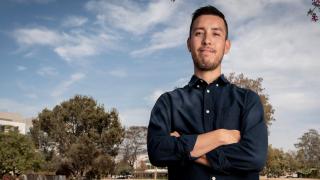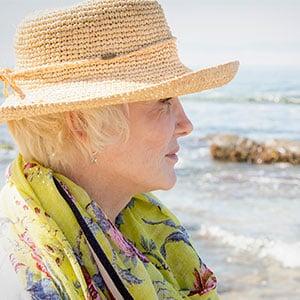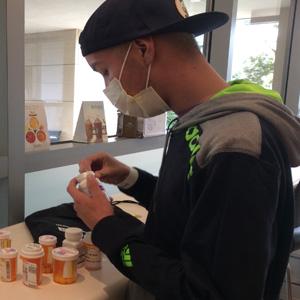With California’s safer-at-home order extended until at least May 15, many people are starting to reach their wits’ end in dealing with this unexpected social isolation. There is a group of people who have been through this before, however: bone marrow and stem cell transplant patients are required to live in isolation for 100 days while their new immune systems establish themselves. This means no trips out and about and no visitors without extensive protective gear for over three months.
For these survivors, COVID-19 isolation orders both feel familiar and trigger old anxieties. We spoke with a few of them for tips on how to cope.
“We’re experiencing what the whole world is experiencing, but I’ve had four years to wrap my head around it,” said multiple myeloma stem cell transplant patient Donna McNutt, 59, who is currently receiving two chemotherapy treatments a month after suffering a relapse last fall. However, it “stirs up all these old feelings. I’m that vulnerable person they’re talking about.”
“Everything was happening so quickly — I had to completely change my lifestyle,” recalled Ivan Garcia, 27, who underwent a bone marrow transplant in 2014 after being diagnosed with acute lymphoblastic leukemia. “I was wearing masks, my mom went to the store and bought wipes and was disinfecting everything. You realize that everything you’re doing is to make sure that you take advantage of a second chance. It’s the same thing now: I wear my mask when I go out, I wear my gloves, I’m constantly washing my hands."
Keep Up a Schedule
“I definitely think the top thing is having a routine,” McNutt said. “I found it very important even when I was having my transplant to not look like a patient. I never wore a hospital gown. It made me feel better. The biggest thing for me was getting dressed. That’s what I’m doing now. It may be in loungewear, but I’m getting dressed.”
“I saw myself switching to being almost being nocturnal” recently, she added. “I told myself, ‘Nope, you’re not doing that.’ I kept my routine, ate my three meals, got up, showered, got dressed.”
“My routine started at the hospital” following his transplant, Garcia recalled. “You wake up. You get ready. You have breakfast. You take your meds. When you have a routine on lockdown, it really does make the day go by quicker. With each passing day you notice the emotional and physical progress. I got a calendar and would cross out each day that would go by to give myself perspective that 100 days isn’t really that much time. Every day when you go to bed, cross off that day. That day is over. Little things like that were super helpful.”
Learn a New Skill or Indulge an Interest
“Try to find a new or undiscovered skill that you may have. You have so much free time on your hands, you might as well try branching out,” Garcia said. “Maybe play the guitar, play the piano. YouTube is fantastic for that. I was watching YouTube on a daily basis — you can learn so much.”
Garcia said he’s always loved to cook. One unfortunate side effect of his BMT was nausea. Another was a temporary loss of his sense of taste due to medication. Still, he used his time in isolation to hone his cooking skills in anticipation of the day he would be able to enjoy food again. “I would watch the Food Network all day long,” he said. “I started cooking for my family, and a few weeks later I regained my sense of taste, and I was so excited to taste food again. If it wasn’t for those 100 days in quarantine, I never would have developed those skills.”
“I did get into reading more during my time at home. It can be a little mind-numbing to try to binge shows or even scroll through the Netflix homepage, but reading can be a really great outlet,” said Krissy Kobata, 37, who underwent a bone marrow transplant for myelodysplastic syndrome in 2018.
Puzzle competitions brought out her competitive streak. “I wasn't a huge fan of puzzles, but doing a timed competition against my boyfriend made it more fun,” she said.
“Find your thing,” McNutt agreed. “Fashion has always been my passion. I had a fantasy day on Sunday where I dressed up in five different things, like I was going to the grocery store, like I was going out to dinner.”
“My husband and I are watching ‘Sex and the City,’" she said. "We’re on season four. He never would have watched that! We’ve been doing that religiously every night. We have dinner and watch an episode. We eat on tray tables. It’s fun! Watch something different, something kind of upbeat.”
Maintain Your Support System
“I had so many FaceTime calls when I was sick, interacting with my friends,” Garcia said. “I had a huge support system. It’s important to make sure that everyone around you is being positive and is on the same page. It gets better emotionally day by day.”
“One of the things that I developed in those 100 days was a really good relationship with my family,” he added. “Before I got sick, I wasn’t spending enough time with my family. When I got sick, I realized at the end of the day the people who are going to be there for you are your family and your close friends. You realize that these people really do love you and will support you no matter what. Thinking about the people that you love that you can’t get to right away is the hardest part for me right now. My family is in California and I’m in Arizona. I’m always talking to them.”
“Communicating in the ways that were allowed with my family and friends really helped,” Kobata said. “Having a regular FaceTime schedule with my brother and his kids was always a highlight for me.”
“If you can, find a friend who you’re able to reach out to and express the ‘full depth of your misery’ so that you can get it out of your system and move on with your life,” McNutt said. “Download your fears, your crazy fears.”
McNutt also said she has “dinner” with her three adult children, who live in the area: She sits in her car in the driveway and they sit on their porch. Or, she sits on her patio and they sit in the driveway. “If you feel lonely, you can drive by your friend’s house and talk from the driveway. I even will leave something on their front porch, a little card or something.”
Be Easy on Yourself
“Isolation and having to stay at home is hard, no matter what the circumstances,” Kobata said. “I think it's OK to admit it, cry about it, have an extra glass of wine, etc. It's tough no matter who you are.”
“You have to go through the shock of it. There’s no doing this wrong. A lot of people slept through the first two weeks” of the COVID-19 stay-at-home order, McNutt said. “The first couple weeks of something like this, it’s like being a cancer patient. You hear that news; it’s a shock and it’s chaotic. Now it’s time to get into a routine. You let that period go and start the next chapter.”
“I think we can guilt ourselves, too. Let the guilt trip go on a trip outside of your house,” she added. “Is there a right way to be? I discovered there was no right way to have cancer. Find your way that’s right for you and don’t let it go.”
“Right now, I say I’m only going to think about what I need to do today. I can dream, though. I would lay in my hospital bed and dream about what I was going to do. I dreamed I was going to take my family on a vacation to Tulum, and a year later we did. Stay today with what you need to do today, but still plan and dream."
“I think I’m doing the best that I can. I try to stay busy and proactive and keep following guidelines. That’s really all you can do,” Garcia said. “Patience was the biggest thing that I learned. I’ve always wanted to see end results quickly. Patience was key. I really learned that you just gotta ride it out.”
Realize You’re Doing This for a Greater Purpose
“It’s just a matter of being informed and being ready. It’s super simple: washing hands and making sure you’re not touching your nose and mouth. It’s nothing new, the concept of being clean and keeping your hands to yourself. Minimize what you touch,” Garcia said. “For me it’s a lifestyle now. I’ve learned to do these things on a daily basis without putting a lot of thought into it.”
“You’re going to have to make some sacrifices at the beginning in order to be OK in the very end. That’s the kind of perspective that you have to follow,” he added. “Day 1 of your transplant you have a very low immune system. I spiked a fever of 101. No one can come in your room. You’re by yourself. You’re in a room with double doors. It’s terrifying. Luckily that only lasted five or six days. I always tell people, don’t risk it, don’t push it. My dad had an expression when I was a kid: ‘You play stupid games, you win stupid prizes.’”
“I hope that people take this seriously and band together virtually, as we will make it through this together,” Kobata said.



